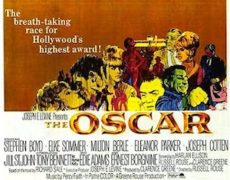
Hollywood On 52nd Street
Maybe September is a 1965 song composed by Jay Livingston, Ray Evans and Percy Faith that was debuted by Tony Bennett in the 1966 drama The Oscar, a film written by Harlan Ellison, Clarence Greene, Russell Rouse and Richard Sale for Paramount Pictures.
The film was directed by Rouse and starred Stephen Boyd, singer Tony Bennett in his film debut, comedian Milton Berle in a dramatic role, Elke Sommer, Ernest Borgnine, Jill St. John, Eleanor Parker, Joseph Cotten, Edie Adams, Peter Lawford, Broderick Crawford, Ed Begley, Walter Brennan and Jack Soo. Appearing as themselves are Bob Hope, Hedda Hopper, Merle Oberon, Frank Sinatra and Nancy Sinatra.
Despite the film’s impressive cast and crew, the film did not win any Oscars, though Bennett did pick up the Golden Turkey Award for Wrost Performance By A Popular Singer. Jay Livingston, Ray Evans and Percy Faith
The Story
Rising movie star Frankie Fane finds himself in Hollywood but has used and abused everyone around him, especially the two women who have loved him. Becoming box office poison, at his lowest point he unexpectedly receives an Oscar nomination, which his agent Kappy believes is the result of Fane’s portrayal of a man without morals, therefore portraying himself. To help insure a win, he hires a detective to spread sympathy rumors to influence the voters. The moment of truth comes at the Academy Awards, as the presenter announces the winner, stating the name Frank, whereupon Fane rises instantaneously to head to the stage, but then hears Sinatra, leaving him stunned and crestfallen. Clapping his hands weakly, everyone in the assemblage whom he has wronged enjoys the comeuppance for this wholly self-absorbed, unfeeling individual.
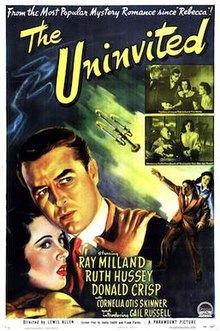
Hollywood On 52nd Street
Stella by Starlight is a popular song by Victor Young that was drawn from thematic material composed for the main title and soundtrack of the 1944 Paramount Pictures film, The Uninvited. Appearing in the film’s underscore as well as in source music as an instrumental theme song without lyrics.
It was turned over to Ned Washington, who wrote the lyrics for it two years later in 1946. The title had to be incorporated into the lyrics, which resulted in its unusual placement: the phrase appears about three-quarters of the way through the song, rather than at the beginning or the end.
At one point in the film, the main character, Rick (Ray Milland) tells Stella (Gail Russell) that he is playing a serenade, To Stella by Starlight.
Plot
Rick (Ray Milland) and his sister Pamela (Ruth Hussey) unknowingly buy a seaside home that is haunted by the ghost of Mary Meredith. Meredith’s husband was a painter who had an affair with his gypsy model, Carmel, Meredith discovers the affair, takes Carmel to and leaves her in Paris, where she gives birth to a child, which ultimately Mary took. Subsequently, Carmel returned to England, takes the infant Stella from Windward, and, during the confrontation, pushes Mary off the cliff to her death. So Mary haunts the house and when Stella returns her affinity to the place is cemented. Rick falls for her but wants her to leave. Seances, ghost visitations by both Camel and Mary, and a sanatorium reveal that Carmel, not Mary is Stella’s mother. This frees Carmel’s spirit from Windward House and with Rick confronting Mary’s spirit announcing he is no longer afraid, the spirit also departs.
Recordings
“Stella by Starlight” is one of the most popular standards, its May 1947 recording by Harry James and his orchestra reached 21st place in the pop charts. Two months later, the recording by Frank Sinatra with Axel Stordahl and his orchestra also rose to the 21st position.
Early adaptations of the song were performed and recorded by Charlie Parker, Stan Getz in December 1952, trumpeter Chet Baker, Bud Powell, Stan Kenton, Nat King Cole. Other recordings have been made by Miles Davis, Red Garland, Earl Grant, Joe Pass, Bill Evans, Art Blakey and the Jazz Messengers, Lou Donaldson, Charlie Rouse, Dexter Gordon, Billy Eckstine, Dick Haymes, Ray Charles, Anita O’Day, Helen Reddy, Tony Bennett, Ella Fitzgerald, Mina, Al Hirt, Larry Coryell, among others.
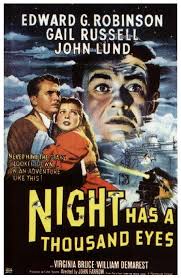
Hollywood On 52nd Street
The Night Has A Thousand Eyes is a song composed by Jerry Brainin, with lyrics by Buddy Bernier. The song was written for the 1948 film noir Night Has a Thousand Eyes and was performed by an unknown band as rhumba in the background of a party.
The film stars Edward G. Robinson and was directed by John Farrow. The film is based on the novel of the same name by Cornell Woolrich, originally published under the pseudonym George Hopley.
Since its introduction, the song has been recorded by a number of artists, among them John Coltrane, Sonny Rollins, Horace Silver, UAB SuperJazz featuring Ellis Marsalis, Harry Belafonte, Paul Desmond with Jim Hall, Toshiko Akiyoshi, Pharoah Sanders, Irene Kral, Harry Beckett, Petula Clark, Gloria Lynne, and Carmen McRae.
The Story
The film opens in New Orleans, where John Triton (Robinson) is “The Mental Wizard”, a nightclub fortune teller. During a show one evening, Triton suddenly urges an audience member to rush home, cautioning that her son is in danger. As the story unfolds, Triton struggles with his new-found psychic ability, as all of his relentlessly bleak predictions prove accurate. Jerome Cowan plays Whitney Courtland, Triton’s best friend, who becomes wealthy using tips from the now-psychic Triton.
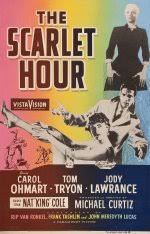
Hollywood On 52nd Street
Never Let Me Go is a song composed and written by Jay Livingston and Ray Evans, that was performed by Nat King Cole in the 1956 American crime drama film, The Scarlet Hour. The movie was directed and produced by Michael Curtiz. The film stars Carol Ohmart, Tom Tryon, Jody Lawrance and Elaine Stritch. The screenplay was based on the story “The Kiss Off” by Frank Tashlin.
The Story
E. V. Marshall, known to all as “Marsh,” works for wealthy real-estate businessman Ralph Nevins and is having an affair with Ralph’s unhappy wife, Paulie. Not wanting to struggle Paulie refuses Marsh’s plea to get a divorce and live without her husband’s money.
Overhearing thieves planning a jewelry heist of the home of a doctor named Lynbury, Paulie pleads with Marsh to rob the jewels from the thieves as they leave the doctor’s house. Suspicious of his wife, Nevins follows, catches them in the act, and gets shot by Paulie. However, Marsh thinks that the thieves shot Nevins.
The police investigation reveals that Dr. Lynbury masterminded the burglary of his own home to collect insurance money after having replaced his wife’s jewels with worthless fakes. Police eventually place Lynbury under arrest and Paulie as well, with Marsh’s cooperation.
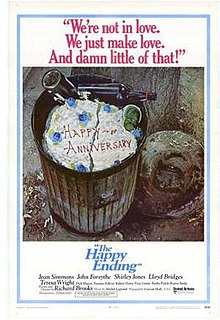
Hollywood On 52nd Street
What Are You Doing the Rest of Your Life? is a song with lyrics written by Alan Bergman and Marilyn Bergman and original music written by Michel Legrand for the 1969 film The Happy Ending. The song was nominated for an Academy Award For Best Original Song but lost out to Raindrops Keep Fallin’ on My Head.
Alan Bergman would recall that after Michel Legrand had written eight melodies that were somehow not viable for the film, Marilyn Bergman suggested the opening line “What are you doing the rest of your life?”, and Legrand then completed the song’s melody based on that phrase.
Marilyn Bergman would later comment on the double meaning of the phrase “What are you doing the rest of your life?” within its parent film: as the romantic theme song’s title the question overtly references the marriage proposal Mary Spencer (played by Jean Simmons) received and accepted sixteen years earlier but, as Mary’s present-day angst becomes apparent, “What are you doing the rest of your life?” is recast as a question Mary must ask herself.
What Are You Doing the Rest of Your Life? was sung in The Happy Ending by Michael Dees whose version was included on the film’s soundtrack album.
The Story
1953: Through the course of a Colorado autumn and winter, Mary Spencer (Simmons) and Fred Wilson (Forsythe) lead an idyllic existence. Mary drops out of college (with 6 months to go) to marry Fred. Their perfect wedding mirrors the happy endings of the films Mary loves. However, there are no fairytale happy endings and sixteen years later Mary is off to find her happiness, leaving behind her husband and daughter, which she eventually does despite her mother and her husband’s pleas.



